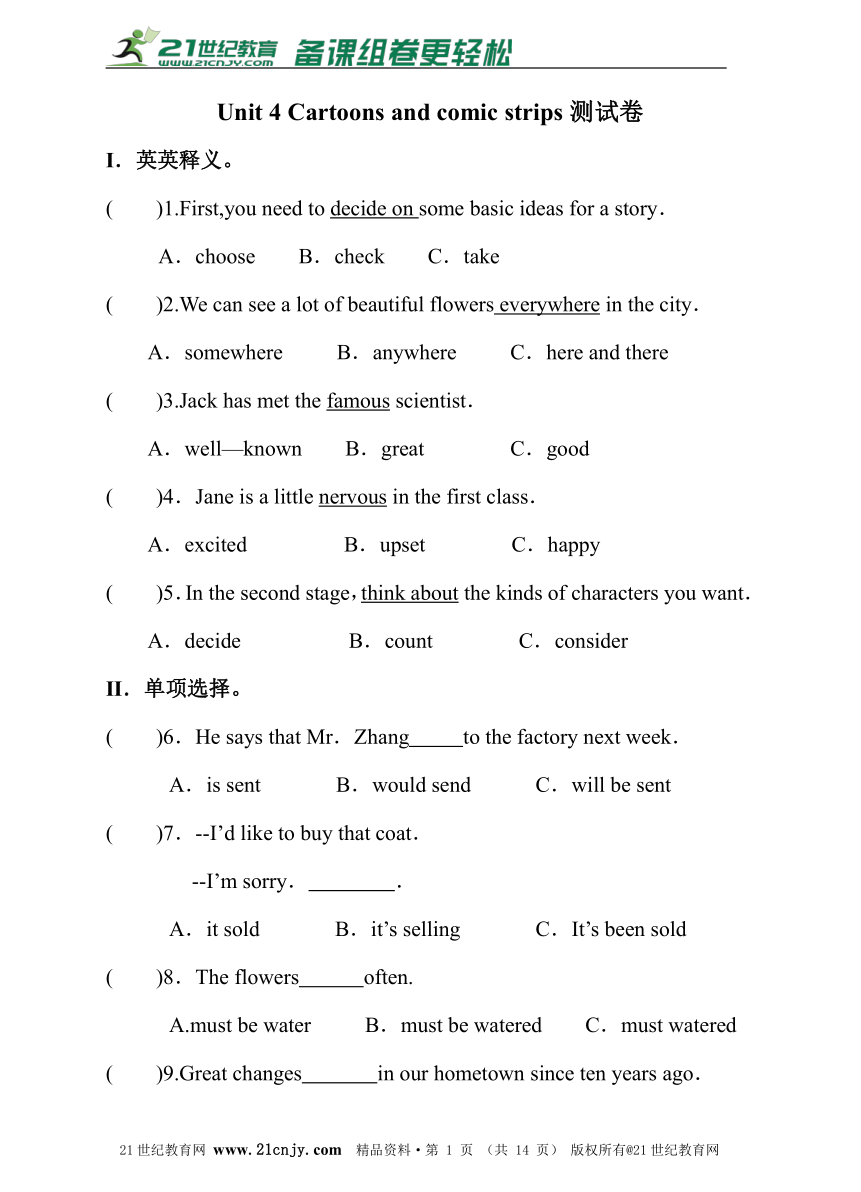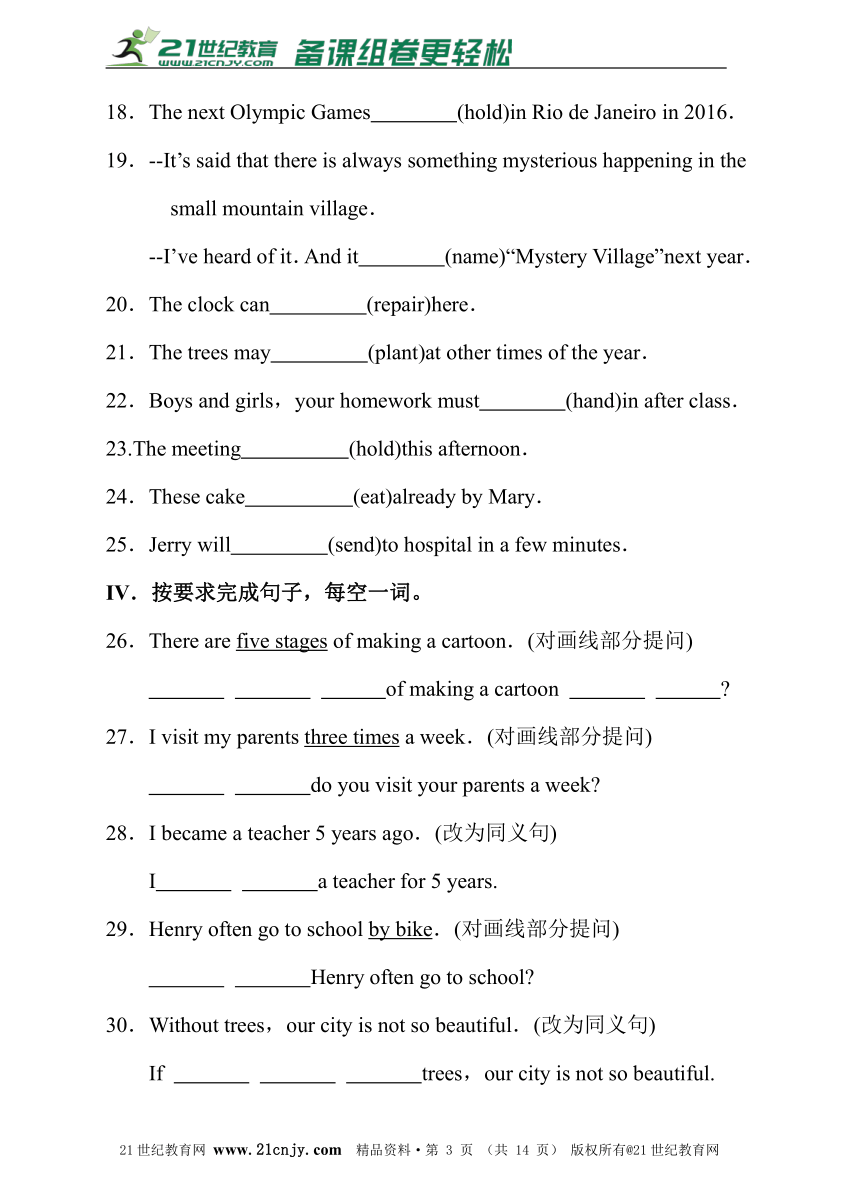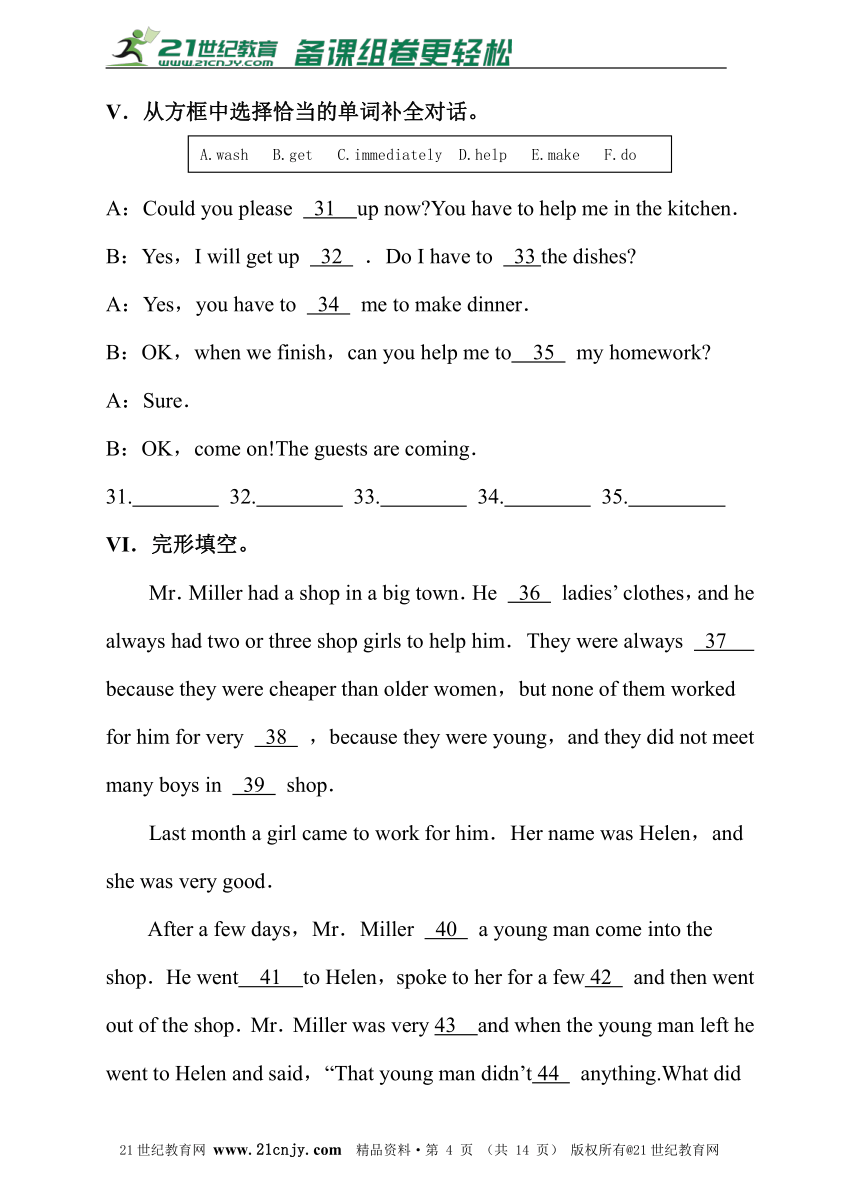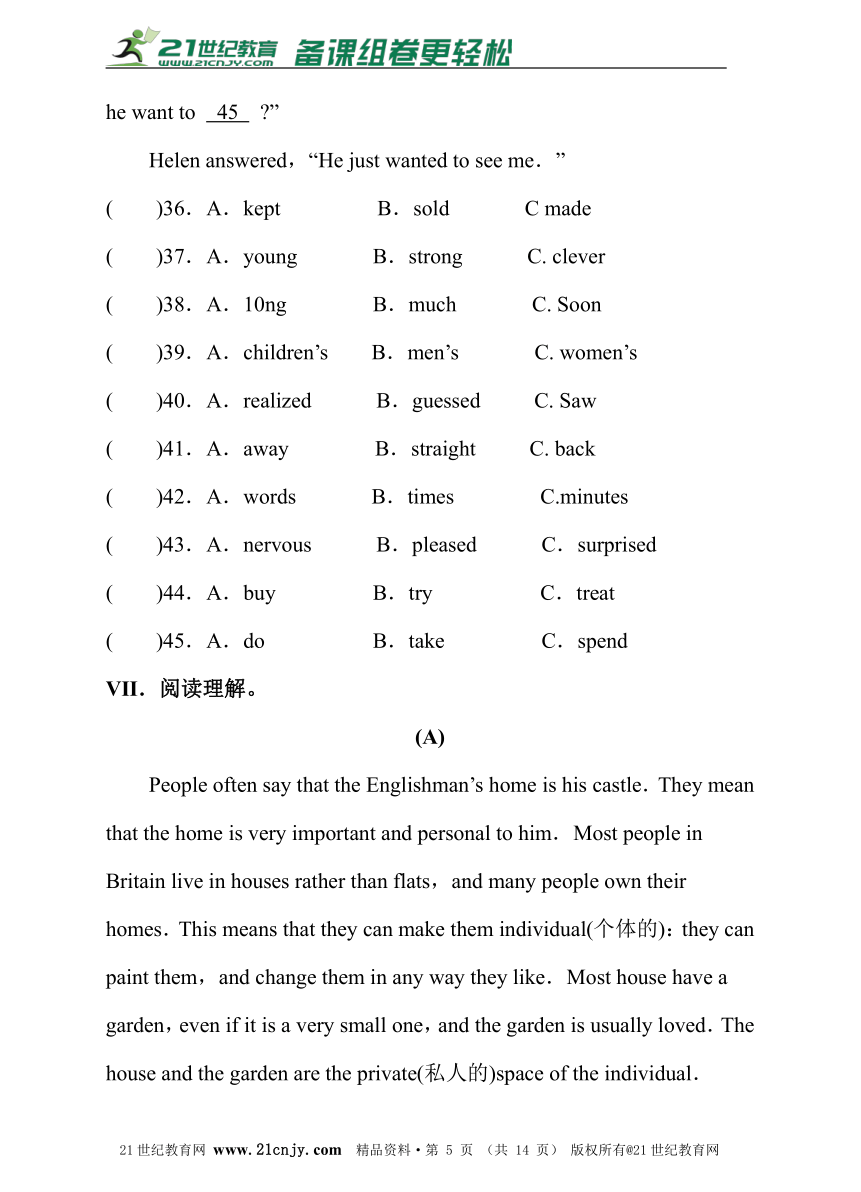牛津深圳版八年级英语下 Unit 4 Cartoons and comic strips测试卷(含答案+解析)
文档属性
| 名称 | 牛津深圳版八年级英语下 Unit 4 Cartoons and comic strips测试卷(含答案+解析) |  | |
| 格式 | zip | ||
| 文件大小 | 328.1KB | ||
| 资源类型 | 试卷 | ||
| 版本资源 | 牛津深圳版 | ||
| 科目 | 英语 | ||
| 更新时间 | 2017-02-17 14:46:30 | ||
图片预览





文档简介
Unit 4 Cartoons and comic strips测试卷
I.英英释义。
( )1.First,you need to decide on some basic ideas for a story.
A.choose B.check C.take
( )2.We can see a lot of beautiful flowers everywhere in the city.
A.somewhere B.anywhere C.here and there
( )3.Jack has met the famous scientist.
A.well—known B.great C.good
( )4.Jane is a little nervous in the first class.
A.excited B.upset C.happy
( )5.In the second stage,think about the kinds of characters you want.
A.decide B.count C.consider
Ⅱ.单项选择。
( )6.He says that Mr.Zhang to the factory next week.
A.is sent B.would send C.will be sent
( )7.--I’d like to buy that coat.
--I’m sorry. .
A.it sold B.it’s selling C.It’s been sold
( )8.The flowers often.
A.must be water B.must be watered C.must watered
( )9.Great changes in our hometown since ten years ago.
A.have happen B.have taken place C.happened
( )10. If you lost the book in the library,you must it.
A.look up B.look at C.look for
( )11.--Mum,can I go to the zoo with Jack?
--When your homework ,you can.
A.is done B.was done C.has been done
( )12.Books by computer in the future.
A.replace B.be replaced C. will be replaced
( )13. When you are in trouble,you can me help.
A.ask;for B.1ook;for C. find;out
( )14.--When should I hand in my paper?
--Your paper must as soon as the bell .
A.hand in;rings B.hand in;will ring C.be handed in ;rings
( )15.--Some parts of China are very thirsty now.I think water
to those places.
--I think so.
A.must send B.must be sent C.be sent
Ⅲ.用括号中所给单词的适当形式填空。
16.They should (help)when they are sick.
17.Don’t worry.Your package (keep)here until you come
back,so enjoy shopping here.
18.The next Olympic Games (hold)in Rio de Janeiro in 2016.
19.--It’s said that there is always something mysterious happening in the
small mountain village.
--I’ve heard of it.And it (name)“Mystery Village”next year.
20.The clock can (repair)here.
21.The trees may (plant)at other times of the year.
22.Boys and girls,your homework must (hand)in after class.
23.The meeting (hold)this afternoon.
24.These cake (eat)already by Mary.
25.Jerry will (send)to hospital in a few minutes.
Ⅳ.按要求完成句子,每空一词。
26.There are five stages of making a cartoon.(对画线部分提问)
of making a cartoon ?
27.I visit my parents three times a week.(对画线部分提问)
do you visit your parents a week?
28.I became a teacher 5 years ago.(改为同义句)
I a teacher for 5 years.
29.Henry often go to school by bike.(对画线部分提问)
Henry often go to school?
30.Without trees,our city is not so beautiful.(改为同义句)
If trees,our city is not so beautiful.
V.从方框中选择恰当的单词补全对话。
A:Could you please 31 up now?You have to help me in the kitchen.
B:Yes,I will get up 32 .Do I have to 33 the dishes?
A:Yes,you have to 34 me to make dinner.
B:OK,when we finish,can you help me to 35 my homework?
A:Sure.
B:OK,come on!The guests are coming.
31. 32. 33. 34. 35.
Ⅵ.完形填空。
Mr.Miller had a shop in a big town.He 36 ladies’ clothes,and he always had two or three shop girls to help him.They were always 37 because they were cheaper than older women,but none of them worked for him for very 38 ,because they were young,and they did not meet many boys in 39 shop.
Last month a girl came to work for him.Her name was Helen,and she was very good.
After a few days,Mr.Miller 40 a young man come into the shop.He went 41 to Helen,spoke to her for a few 42 and then went out of the shop.Mr.Miller was very 43 and when the young man left he went to Helen and said,“That young man didn’t 44 anything.What did he want to 45 ?”
Helen answered,“He just wanted to see me.”
( )36.A.kept B.sold C made
( )37.A.young B.strong C. clever
( )38.A.10ng B.much C. Soon
( )39.A.children’s B.men’s C. women’s
( )40.A.realized B.guessed C. Saw
( )41.A.away B.straight C. back
( )42.A.words B.times C.minutes
( )43.A.nervous B.pleased C.surprised
( )44.A.buy B.try C.treat
( )45.A.do B.take C.spend
Ⅶ.阅读理解。
(A)
People often say that the Englishman’s home is his castle.They mean that the home is very important and personal to him.Most people in Britain live in houses rather than flats,and many people own their homes.This means that they can make them individual(个体的):they can paint them,and change them in any way they like.Most house have a garden,even if it is a very small one,and the garden is usually loved.The house and the garden are the private(私人的)space of the individual.
People usually like to mark their space.Are you sitting now in your home or on a train?Have you marked the space around yourself as yours?If you are on the train you may put your coat or small bag on the seat beside you.If you share a flat you may have one corner or chair which is your own.
Once l was travelling on a train to London.I was in a section for four people and there was a table between us.The man on the space on my side of the table didn’t notice me at all.1 was angry.Maybe he thought that he owned the whole table.I had read a book about non—verbal communication,so I took various papers out of my bag and put them on his briefcase!When I did this he stiffened and his eyes nearly popped(瞪出)out of his head.I had invaded(侵犯)his space!A few minutes later I took my papers off his case in order to read them.He immediately moved his case to his side of the table.Of course,it is possible that he just wanted to be helpful to me!
If you are visiting another country you may feel that you don’t have any private space.Hotel rooms look much the same in every country in the world.All day long,you share public spaces with other people.You see the local people in their private spaces and you feel lonely and “outside”.Local people can create their private spaces by talking about things you don’t know about.And you even feel that they like you to be outside them so that they will enjoy being inside even more!This is one of the difficulties of being a traveler!But if you understand it then it helps you.Haven’t you enjoyed being part of a group and“owning”a bit of space?
( )46.The writer was angry as he was travelling on a train to London
because .
A.he had no place to sit
B.someone had invaded his“space’’
C.too many people shared a section with him
D.some other people talked about things he didn’t know about
( )47.“…you feel lonely and‘outside”’in paragraph 4 means
that .
A.you are alone outside the house
B.you feel lonely because you travel on your own
C.you are alone and therefore you go outside to have some fun
D. you feel lonely and you don’t belong to that place or that group
of people
( )48.In Paragraph 4,the pronoun“them”refers to(所指)“ ”
A.public spaces B.private spaces
C.local people D. other countries
( )49.Which of the following is TRUE according to the passage?
A.British people dislike marking their space.
B.You always feel at home in another country.
C.Most British people prefer living in houses to fiats.
D.You can’t mark your private space in a foreign country.
( )50.The main purpose of the passage is to tell readers to .
A.own private spaces by living in houses
B. have one corner of their own in public places
C. realize the importance of "space" in communication
D. create their private spaces by talking with local people
(B)
When I was a foreign teacher in China, every day I taught English to my students and they taught me about China.One day the topic turned to saying "I love you". I was shocked to learn that not one of my students had said this to their mothers, nor had their mothers said it to them. "Does your morn love you?" "Of course," they answered.
"How do you know?" was my logical question.They responded that their moms cooked and always told them what they were doing wrong to show their caring.I was stunned.So mom's cooking and criticizing read out as "I love you". "Then how do you say 'I love you’ to her?" They agreed that getting good grades, followed by good jobs would be how they showed their love.
I come from a culture where most people are expressive enough, so I repeated these queries in classes over time. Gradually, I began to get different response. Some of them had exchanged those sentiments with their morns.
One of my favorite stories of change came from a girl. When she came home from university, her mother met her at the door and hugged (拥抱) her.This had never happened before, but her morn said, "Now that you have gone, I have more time to myself. I noticed that in some places mothers and children hug each other and I decided it was a good idea and that I would begin hugging you. "
In my family we all say "I love you" a lot.While it is true that we often say the words without having great depth of feelings at that moment, it is almost like a blessing we give each other. Those three little words carry a world of meaning, even when said as a greeting, but most especially if they are the last words we say to or hear from those we love.
( )51.What’s the author’s job?
A.A worker. B.A doctor.
C.A story teller. D.A teacher
( )52.The foreign teacher .
A.comes from America B.is a young woman
C.is expressive enough D.knows much about China
( )53.Chinese people prefer to show love by .
A.saying“I love you” B.cooking
C.getting good grades D.doing something helpful
( )54.In paragraph 4,what’s the real meaning of the mom’s hugging?
A.She is meeting her daughter at the door.
B.She loves her daughter and misses her.
C.She is glad that she has more time to herself.
D.She finds it interesting to hug her daughter.
( )55.What’s the main idea of the passage?
A.Say“I love you”more to your family.
B.Say“I love you”a lot to Chinese people.
C.Say“I love you”as a greeting to others.
D.Say“I love you”without great depth of feelings.
Ⅷ.书面表达。
请以My Future Life为题写一篇80词左右的作文,畅想一下你未来的生活。
提示语:grow up,raise one’s family,achieve one’s goal
参考答案
I.1.A 【解析】decide on意为“决定;确定”,即作出选择,与A
项同义。
2.C 【解析】everywhere意为“到处”,与here and there同义。
3.A 【解析】famous意为“著名的”,与well—know同义。
4.B 【解析1 nervous意为“焦虑的,紧张的”,与upset同义。
5.C 【解析1 think about意为“考虑”,与consider同义。
Ⅱ.6.C 【解析】旬意:他说张先生下个星期将会被派到工厂。
7.C 【解析】旬意: “我想买那件外套。”“对不起,它已经被
卖出去了。”
8.B 【解析】句意:这些花必须经常被浇水。
9.B 【解析】句意:自从十年以前,我的故乡发生了巨大的变
化。
10.C 句意:如果你在图书馆丢了那本书,你必须将它找回来。
11.C 【解析】句意:“妈妈,我能和杰克一起去动物园吗?”“当
你的家庭作业被做完的时候,你可以去。”
12.C 【解析】句意:将来,书将会被电脑取代。
13.A 【解析】句意:当你有困难的时候,可以向我寻求帮助。
ask for是固定搭配。
14.C 【解析】句意:“我应该什么时候交卷?”“你的试卷应该铃
一响就交。”
15.B 【解析】句意:“中国的一些地区非常缺水,我认为水必
须现在被运往那些地方。”“我也这样认为。”
Ⅲ.16.be helped 17.will be kept
18.will be held 19.will be named
20.be repaired 21.be planted
22.be handed 23.will be held
24.has been eaten 25.be sent
Ⅳ.26.How many stages;are there
27.How often
28.have been
29.How does
30.there are no
V.31.B 32.C 33.A 34.D 35.F
Ⅵ.36.B 【解析】根据常识,商店应是“卖东西”,而不是“保存东
西”“制造东西”或“修理东西”。
37.A 【解析】从后面的0lder women可知此处填young。
38.A 【解析】由上下文可知,没有女孩儿愿意在这里工作很
长时间。
39.C 【解析】根据上文,这是一家卖女士服装的商店。
40.C 【解析1 see sb.do sth.是固定搭配,意为“看见某人做
某事”。
41.B 【解析】表示“径直”用straight。
42.C 【解析】由于前面有介词for,所以用minutes。for a few
minutes意为“一会儿”,表示一段时间。
43.C
44.A
45 A
Ⅶ.A
46.B 【解析】由文章第三段开头部分可知,作者在去伦敦的火
车上,一个人无视他侵占了他的空间,所以他很生气。
47.D 【解析】由文章第四段可知,当拜访一个新地方时,你会
感到孤独和没有归属感,感觉自己不属于那个地方或不合群。
48.C
49.C 【解析】由文章第一段可知,大多数英国人喜欢住自己家
里而不是公寓里,因为他们喜欢有自己的私人空间,不喜欢被
侵犯。
50.C 【解析】作者写这篇文章的目的是让我们意识到空间在交
流中的重要性,故选C。
B
51.D 【解析】由文章开头可知,作者是位教师。
52.C 【解析】从第三段中“T come from a culture where most people
are expressive enough”可以判断答案选C。
D 【解析】通读全文可知,中国人一般不说“I love you”,而是
用实际行动做一些有帮助的事来表达这种情感。
54.B
55.A
Ⅶ.One possible version:
My Future Life
1 want to grow up as soon as possible.When I grow up,I can do many things that I can’t do now.However,at the same time,I don’t know what my future life would be. Look around myself,some people are busy working for having enough food to eat and live better,some are achieving every goal that they make,some may live in the poor situation.I don’t know what kind of life l would have in the future.But I know that everyone’s life is in their hands.S0 1 will try my best to work hard for a better future life.
I.英英释义。
( )1.First,you need to decide on some basic ideas for a story.
A.choose B.check C.take
( )2.We can see a lot of beautiful flowers everywhere in the city.
A.somewhere B.anywhere C.here and there
( )3.Jack has met the famous scientist.
A.well—known B.great C.good
( )4.Jane is a little nervous in the first class.
A.excited B.upset C.happy
( )5.In the second stage,think about the kinds of characters you want.
A.decide B.count C.consider
Ⅱ.单项选择。
( )6.He says that Mr.Zhang to the factory next week.
A.is sent B.would send C.will be sent
( )7.--I’d like to buy that coat.
--I’m sorry. .
A.it sold B.it’s selling C.It’s been sold
( )8.The flowers often.
A.must be water B.must be watered C.must watered
( )9.Great changes in our hometown since ten years ago.
A.have happen B.have taken place C.happened
( )10. If you lost the book in the library,you must it.
A.look up B.look at C.look for
( )11.--Mum,can I go to the zoo with Jack?
--When your homework ,you can.
A.is done B.was done C.has been done
( )12.Books by computer in the future.
A.replace B.be replaced C. will be replaced
( )13. When you are in trouble,you can me help.
A.ask;for B.1ook;for C. find;out
( )14.--When should I hand in my paper?
--Your paper must as soon as the bell .
A.hand in;rings B.hand in;will ring C.be handed in ;rings
( )15.--Some parts of China are very thirsty now.I think water
to those places.
--I think so.
A.must send B.must be sent C.be sent
Ⅲ.用括号中所给单词的适当形式填空。
16.They should (help)when they are sick.
17.Don’t worry.Your package (keep)here until you come
back,so enjoy shopping here.
18.The next Olympic Games (hold)in Rio de Janeiro in 2016.
19.--It’s said that there is always something mysterious happening in the
small mountain village.
--I’ve heard of it.And it (name)“Mystery Village”next year.
20.The clock can (repair)here.
21.The trees may (plant)at other times of the year.
22.Boys and girls,your homework must (hand)in after class.
23.The meeting (hold)this afternoon.
24.These cake (eat)already by Mary.
25.Jerry will (send)to hospital in a few minutes.
Ⅳ.按要求完成句子,每空一词。
26.There are five stages of making a cartoon.(对画线部分提问)
of making a cartoon ?
27.I visit my parents three times a week.(对画线部分提问)
do you visit your parents a week?
28.I became a teacher 5 years ago.(改为同义句)
I a teacher for 5 years.
29.Henry often go to school by bike.(对画线部分提问)
Henry often go to school?
30.Without trees,our city is not so beautiful.(改为同义句)
If trees,our city is not so beautiful.
V.从方框中选择恰当的单词补全对话。
A:Could you please 31 up now?You have to help me in the kitchen.
B:Yes,I will get up 32 .Do I have to 33 the dishes?
A:Yes,you have to 34 me to make dinner.
B:OK,when we finish,can you help me to 35 my homework?
A:Sure.
B:OK,come on!The guests are coming.
31. 32. 33. 34. 35.
Ⅵ.完形填空。
Mr.Miller had a shop in a big town.He 36 ladies’ clothes,and he always had two or three shop girls to help him.They were always 37 because they were cheaper than older women,but none of them worked for him for very 38 ,because they were young,and they did not meet many boys in 39 shop.
Last month a girl came to work for him.Her name was Helen,and she was very good.
After a few days,Mr.Miller 40 a young man come into the shop.He went 41 to Helen,spoke to her for a few 42 and then went out of the shop.Mr.Miller was very 43 and when the young man left he went to Helen and said,“That young man didn’t 44 anything.What did he want to 45 ?”
Helen answered,“He just wanted to see me.”
( )36.A.kept B.sold C made
( )37.A.young B.strong C. clever
( )38.A.10ng B.much C. Soon
( )39.A.children’s B.men’s C. women’s
( )40.A.realized B.guessed C. Saw
( )41.A.away B.straight C. back
( )42.A.words B.times C.minutes
( )43.A.nervous B.pleased C.surprised
( )44.A.buy B.try C.treat
( )45.A.do B.take C.spend
Ⅶ.阅读理解。
(A)
People often say that the Englishman’s home is his castle.They mean that the home is very important and personal to him.Most people in Britain live in houses rather than flats,and many people own their homes.This means that they can make them individual(个体的):they can paint them,and change them in any way they like.Most house have a garden,even if it is a very small one,and the garden is usually loved.The house and the garden are the private(私人的)space of the individual.
People usually like to mark their space.Are you sitting now in your home or on a train?Have you marked the space around yourself as yours?If you are on the train you may put your coat or small bag on the seat beside you.If you share a flat you may have one corner or chair which is your own.
Once l was travelling on a train to London.I was in a section for four people and there was a table between us.The man on the space on my side of the table didn’t notice me at all.1 was angry.Maybe he thought that he owned the whole table.I had read a book about non—verbal communication,so I took various papers out of my bag and put them on his briefcase!When I did this he stiffened and his eyes nearly popped(瞪出)out of his head.I had invaded(侵犯)his space!A few minutes later I took my papers off his case in order to read them.He immediately moved his case to his side of the table.Of course,it is possible that he just wanted to be helpful to me!
If you are visiting another country you may feel that you don’t have any private space.Hotel rooms look much the same in every country in the world.All day long,you share public spaces with other people.You see the local people in their private spaces and you feel lonely and “outside”.Local people can create their private spaces by talking about things you don’t know about.And you even feel that they like you to be outside them so that they will enjoy being inside even more!This is one of the difficulties of being a traveler!But if you understand it then it helps you.Haven’t you enjoyed being part of a group and“owning”a bit of space?
( )46.The writer was angry as he was travelling on a train to London
because .
A.he had no place to sit
B.someone had invaded his“space’’
C.too many people shared a section with him
D.some other people talked about things he didn’t know about
( )47.“…you feel lonely and‘outside”’in paragraph 4 means
that .
A.you are alone outside the house
B.you feel lonely because you travel on your own
C.you are alone and therefore you go outside to have some fun
D. you feel lonely and you don’t belong to that place or that group
of people
( )48.In Paragraph 4,the pronoun“them”refers to(所指)“ ”
A.public spaces B.private spaces
C.local people D. other countries
( )49.Which of the following is TRUE according to the passage?
A.British people dislike marking their space.
B.You always feel at home in another country.
C.Most British people prefer living in houses to fiats.
D.You can’t mark your private space in a foreign country.
( )50.The main purpose of the passage is to tell readers to .
A.own private spaces by living in houses
B. have one corner of their own in public places
C. realize the importance of "space" in communication
D. create their private spaces by talking with local people
(B)
When I was a foreign teacher in China, every day I taught English to my students and they taught me about China.One day the topic turned to saying "I love you". I was shocked to learn that not one of my students had said this to their mothers, nor had their mothers said it to them. "Does your morn love you?" "Of course," they answered.
"How do you know?" was my logical question.They responded that their moms cooked and always told them what they were doing wrong to show their caring.I was stunned.So mom's cooking and criticizing read out as "I love you". "Then how do you say 'I love you’ to her?" They agreed that getting good grades, followed by good jobs would be how they showed their love.
I come from a culture where most people are expressive enough, so I repeated these queries in classes over time. Gradually, I began to get different response. Some of them had exchanged those sentiments with their morns.
One of my favorite stories of change came from a girl. When she came home from university, her mother met her at the door and hugged (拥抱) her.This had never happened before, but her morn said, "Now that you have gone, I have more time to myself. I noticed that in some places mothers and children hug each other and I decided it was a good idea and that I would begin hugging you. "
In my family we all say "I love you" a lot.While it is true that we often say the words without having great depth of feelings at that moment, it is almost like a blessing we give each other. Those three little words carry a world of meaning, even when said as a greeting, but most especially if they are the last words we say to or hear from those we love.
( )51.What’s the author’s job?
A.A worker. B.A doctor.
C.A story teller. D.A teacher
( )52.The foreign teacher .
A.comes from America B.is a young woman
C.is expressive enough D.knows much about China
( )53.Chinese people prefer to show love by .
A.saying“I love you” B.cooking
C.getting good grades D.doing something helpful
( )54.In paragraph 4,what’s the real meaning of the mom’s hugging?
A.She is meeting her daughter at the door.
B.She loves her daughter and misses her.
C.She is glad that she has more time to herself.
D.She finds it interesting to hug her daughter.
( )55.What’s the main idea of the passage?
A.Say“I love you”more to your family.
B.Say“I love you”a lot to Chinese people.
C.Say“I love you”as a greeting to others.
D.Say“I love you”without great depth of feelings.
Ⅷ.书面表达。
请以My Future Life为题写一篇80词左右的作文,畅想一下你未来的生活。
提示语:grow up,raise one’s family,achieve one’s goal
参考答案
I.1.A 【解析】decide on意为“决定;确定”,即作出选择,与A
项同义。
2.C 【解析】everywhere意为“到处”,与here and there同义。
3.A 【解析】famous意为“著名的”,与well—know同义。
4.B 【解析1 nervous意为“焦虑的,紧张的”,与upset同义。
5.C 【解析1 think about意为“考虑”,与consider同义。
Ⅱ.6.C 【解析】旬意:他说张先生下个星期将会被派到工厂。
7.C 【解析】旬意: “我想买那件外套。”“对不起,它已经被
卖出去了。”
8.B 【解析】句意:这些花必须经常被浇水。
9.B 【解析】句意:自从十年以前,我的故乡发生了巨大的变
化。
10.C 句意:如果你在图书馆丢了那本书,你必须将它找回来。
11.C 【解析】句意:“妈妈,我能和杰克一起去动物园吗?”“当
你的家庭作业被做完的时候,你可以去。”
12.C 【解析】句意:将来,书将会被电脑取代。
13.A 【解析】句意:当你有困难的时候,可以向我寻求帮助。
ask for是固定搭配。
14.C 【解析】句意:“我应该什么时候交卷?”“你的试卷应该铃
一响就交。”
15.B 【解析】句意:“中国的一些地区非常缺水,我认为水必
须现在被运往那些地方。”“我也这样认为。”
Ⅲ.16.be helped 17.will be kept
18.will be held 19.will be named
20.be repaired 21.be planted
22.be handed 23.will be held
24.has been eaten 25.be sent
Ⅳ.26.How many stages;are there
27.How often
28.have been
29.How does
30.there are no
V.31.B 32.C 33.A 34.D 35.F
Ⅵ.36.B 【解析】根据常识,商店应是“卖东西”,而不是“保存东
西”“制造东西”或“修理东西”。
37.A 【解析】从后面的0lder women可知此处填young。
38.A 【解析】由上下文可知,没有女孩儿愿意在这里工作很
长时间。
39.C 【解析】根据上文,这是一家卖女士服装的商店。
40.C 【解析1 see sb.do sth.是固定搭配,意为“看见某人做
某事”。
41.B 【解析】表示“径直”用straight。
42.C 【解析】由于前面有介词for,所以用minutes。for a few
minutes意为“一会儿”,表示一段时间。
43.C
44.A
45 A
Ⅶ.A
46.B 【解析】由文章第三段开头部分可知,作者在去伦敦的火
车上,一个人无视他侵占了他的空间,所以他很生气。
47.D 【解析】由文章第四段可知,当拜访一个新地方时,你会
感到孤独和没有归属感,感觉自己不属于那个地方或不合群。
48.C
49.C 【解析】由文章第一段可知,大多数英国人喜欢住自己家
里而不是公寓里,因为他们喜欢有自己的私人空间,不喜欢被
侵犯。
50.C 【解析】作者写这篇文章的目的是让我们意识到空间在交
流中的重要性,故选C。
B
51.D 【解析】由文章开头可知,作者是位教师。
52.C 【解析】从第三段中“T come from a culture where most people
are expressive enough”可以判断答案选C。
D 【解析】通读全文可知,中国人一般不说“I love you”,而是
用实际行动做一些有帮助的事来表达这种情感。
54.B
55.A
Ⅶ.One possible version:
My Future Life
1 want to grow up as soon as possible.When I grow up,I can do many things that I can’t do now.However,at the same time,I don’t know what my future life would be. Look around myself,some people are busy working for having enough food to eat and live better,some are achieving every goal that they make,some may live in the poor situation.I don’t know what kind of life l would have in the future.But I know that everyone’s life is in their hands.S0 1 will try my best to work hard for a better future life.
同课章节目录
